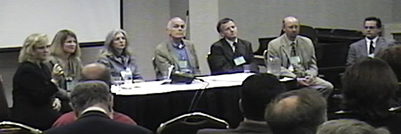Friday's Morning Panel
| Panel Moderator |
Sten Ternström |
| Panel Members |
Heidi Vogley, Karen Wicklund, Linda Carroll, Donald Miller, David
Howard, Martin Spencer, Daniel Ihasz (left to right in following
picture) |
| Picture of Panel |
 |
| Panel Introduction by the Moderator |
We’ve had a mixed offering this morning. The first half
was about using technology in the singing studio and the second
half was mostly to do with singing education. We shall first take
questions at the microphone from where we finished earlier [with
Karen Wicklund and Heidi Vogley’s presentation on Therapeutic
Protocols for the Vocally Injured University Singer: Rehabilitation
Through Collaboration]. Audio
link. |
| Irene Feher – As you are evaluating,
these students are keeping records of themselves; have you noticed
what generally turns up as the main cause of these vocal problems?
Audio link. |
| |
 |
Heidi Vogley and Karen Wicklund. Audio
link. |

| Irene Feher – My next question
may be too long to answer, so if you could maybe just relate it
to some studies: You had mentioned a relationship between diaphragmatic
breathing and acid reflux, and I thought that was interesting.
Audio link. |
| |
 |
Heidi Vogley, with further commentary on reflux
from Martin Spencer (partially off-microphone). Audio
link. |

| Jim Doing – You mentioned something
about how if a student is vocally injured and develops nodes or
something, do they fall under the disability act? We had a student
a year ago and she developed nodes; she was in this heavy-duty
gospel choir and she was leaning on it so much that she gets pretty
much thrashed. So we gave her an incomplete until she went to
therapy and was in better shape. My question is, was it OK to
give someone an incomplete until they could do the work, now that
you have a therapeutic jury….and can you give us a few ideas
of therapeutic songs? Audio
link. |
| |
 |
Audio link. |

| [Discussion] Sten Ternstrom –
Martin Spencer you said toward the end of your talk when we’re
talking about progress of students through their training that
wouldn’t it be great to have a program where we could record
their progress longitudinally. I think actually there are a few
places, at least in Europe, where this is happening ….[listen
to audio link for further discussion about longitudinal studies
to develop a bank of information.] Audio
link. |
| |

| Unidentified audience member for Don
Miller – Would you have concluded that there is a distinct
middle register from your presentation? Are you saying there is
one, isn’t one, or it varies from person to person? Can
you help me with the definition of mixed registers are? Audio
link. |
| |
 |
Answer & further discussion of registers and terminology
in commercial, classical and research. Audio
link. |

| Philip Sargent – For the last
presentation, you spoke about the charges for the therapeutic
protocols, but didn’t mention costs. Do you have figures
for what the cost is for either your program or a per student
basis, yearly basis and how are those costs born by the university?
Audio link. |
| |
 |
Heidi Vogley. Audio
link. |
 |
Linda Carroll. Audio
link. |

| Jennifer Spielman – Regarding
the last presentation, I’m a speech language pathologist
and a voice rehabilitator, although I mostly work with Parkinson’s
patients, and I’m also a singer. One of the general recommendations
I have, when you are using the term therapeutic singing
protocol, the first thing that comes to my mind is "what
are these exercises, why theoretically are they being used for
specific injuries"– you didn’t mention the whole
variety of injuries that would be possible, and "have they
been tested?" You did mention that you were going to do some
testing. But in my mind I think "ok, this person has this
sort of injury, there are a couple techniques out there that a
professional voice rehabilitator would be qualified to use, and
the speech-language pathology realm also". So were the singing
exercises taken from the stand point of truly being rehabilitative
and having sort of theoretical and maybe scientific grounding,
or sort of from the point of view of "well, let's just go
back to the basics of singing, these were a little easier, we’re
going to sort of start from the beginning and sort of broaden
these things out"? I want some research behind the therapy
part of that. Audio link. |
| |
 |
Answer from Karen Wicklund and Heidi Vogley –
further discussion including Kate Emerich. Audio
link. |

|

